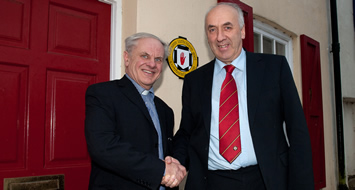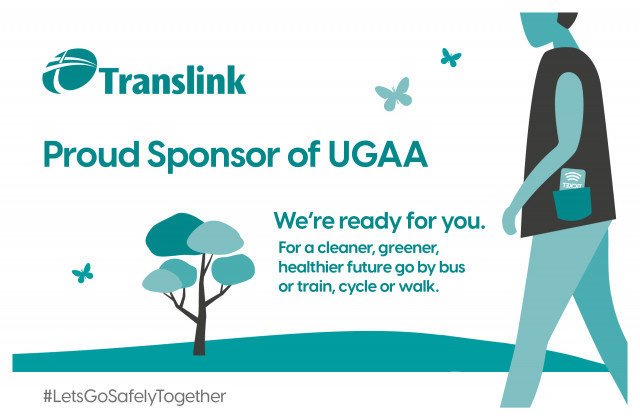Building a Constructive Friendship
 By Danny Murphy, Provincial Director (CEO) Ulster Council of the Gaelic Athletic Association.
By Danny Murphy, Provincial Director (CEO) Ulster Council of the Gaelic Athletic Association.
It was a great privilege to welcome Rev Dr. Norman Hamilton to the Ulster GAA Club and Community Conference in October, to both engage with and challenge the GAA as a friend and fellow Christian.
Since January 2011 Ulster GAA and I have enjoyed an open and constructive friendship with Dr. Hamilton and the Presbyterian Church. That friendship was forged in the midst of tragedy, as it was during our first meeting with Norman in Ulster GAA headquarters that news reached us that Michaela McAreavey had died. In the moments that followed the delivery of that terrible news Norman did what any good Christian and Pastor would do he offered words and comfort and also a prayer. As I sat and listened to Norman pray for Michaela, her husband John and the Harte family I was overcome with emotion at the loss of the young woman who was the embodiment of everything that was good about the GAA. I also was deeply touched at the compassionate words of a man who represented a Church who traditionally had no link with the GAA. As with so many things in life it is in the darkest hours of despair and tragedy that we find hope for what the future of this island can be.
When I invited Norman to attend our Conference I asked him to come and share with us his views and also act as critical friend to the GAA, in particular our membership wanted to hear his views on how all of us can work together to build a better and shared future.
Norman offered us some challenges and I am privileged to be allowed a platform to respond to them in this article. The first challenge was on how we can de politicised or “de football” the Irish Language. Norman highlighted that Irish has been used and abused as part of a political game. I strongly welcome this challenge and agree with him that we need a mature debate at both political and community level about how we both use and respect the indigenous language of this island. As Norman pointed out the Presbyterian Church itself had a strong affinity with the language right up to the 1900’s. It is my strong view that an appropriate Irish Language Act that respects the right of those who do not use or want to use Irish. As an organisation who promotes the use of the Irish Language we must also show confidence and leadership when it comes to its ongoing use, our language should never been used to mark territory or to show disrespect to the different cultural traditions that share this island.
Queen Elizabeth rightly showed Irish language respect when she addressed President McAleese in Dublin Castle during her recent visit and several high profile leaders within the Unionist Community have signed up to the Loifa project with the aim to learn Irish by 2015. The Good Friday Agreement states it is the birthright of the people to identify themselves and be accepted as Irish or British, or both. Respect for each other’s different identities is vital in building a new shared future but does not mean that we cannot work and live together as one Community. No one should fear the language or Irish Culture nor should anyone fear British and Ulster Scots Culture. It is vital that both the Irish and British identities, which share this island, are shown respect.
Norman rightly pointed out that the GAA is an organisation that has a strong sense of place and community our volunteer ethos and our strong sense of Irish identity are core values that our 1 million members hold dear. However I do recognise that for many different reasons that there is a level of suspicion and mistrust from elements of the Unionist Community towards the GAA and it is our duty to educate everyone to what the GAA is and does and combat the misinformation campaign that has been directed towards the GAA by various interests.
We have since 2007 engaged strongly in a community outreach programme in order to develop friendships and partnerships with individuals and groups who traditionally never had any linkage to the GAA, this engagement is built on openness and respect. The proposal that the GAA establish or be involved in a forum in order to engage with the wider Unionist Community has merit, indeed the GAA Director Paraic Duffy and I have recently had meetings with Cooperation Ireland to discuss widening our Community Engagement and Outreach programme and I hope in the coming months that I will be in a position to make further comment on this initiative, to quote my hero Dr. Martin Luther King, “the time is always right to do what is right”.
Finally as we enter a decade of commemoration I want to state emphatically that the GAA will play it part in ensuring that over the next 10 years each commemorative event is shown respect. I have in the past and I will again call for the next ten years to become a Decade of Reconciliation were we educate each other to our different traditions and historical perspectives and if the GAA is invited it will send a representative to every event that takes place over the next decade. The events of a century ago still resonate in the Ulster and Ireland of today and I agree strongly with the comments made by Norman in October when he said we must dispel the myths and let the facts no mater how uncomfortable surface to be properly interpreted.
The GAA will continue to be vibrant and confident organisation, willing to play its part in building a shared and better future for everyone on this island, we are committed to respecting and engaging with all the different traditions on this island and we will never walk away from the challenge of peace.
In conclusion I want to pay tribute to Norman Hamilton, a true man of God, we share a common bond as Ulster men and a vision for a shared future that is built on tolerance and mutual respect, our friendship is a constructive one that allows us to challenge each other constructively and respect our sometimes differing views. The relationship and friendship between the GAA and the Presbyterian Church is strong and I hope it will continue to grow as we engage and challenge each other constructively. In the words of Winston Churchill, Now this is not the end. It is not even the beginning of the end. But it is, perhaps, the end of the beginning.






